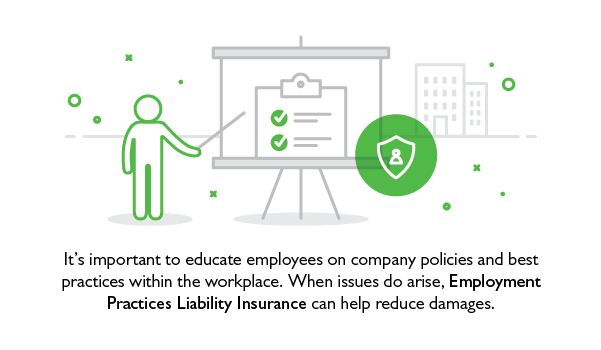Employment Practices Liability Insurance (EPLI) provides financial protection for businesses when the legal rights of employees are violated. From sexual harassment to mismanagement of employee benefits, businesses are sued by their workers for all kinds of disputes.
If you’re the owner of a business and you’re considering purchasing an EPLI policy, you’ll want to understand the basics of the product, such as which lawsuits it protects you against and how much it all costs. Also, it’s important to make sure you’re doing everything you can to avoid violating your employees’ rights in the first place.

What kind of coverage does EPLI provide?
EPLI can financially protect your company against a long list of employee lawsuits. The claims in which EPLI provides coverage for include, but are not limited to:
- Sexual harassment
- Wrongful termination
- Discrimination
- Breach of employment contract
- Deprivation of career opportunity
For example, if one of your employees is sexually harassed in the workplace, your company may be in violation of Title VII of the Civil Rights Act of 1964. This law protects workers from unwanted sexual advances and other forms of inappropriate conduct while on the job. It also enables victims of workplace sexual harassment to be legally compensated for associated damages.
As an employer, you can’t always control the words and actions of those who work for you, so it’s important to have a financial safety net in case an incident like that occurs. Without EPLI coverage, you can get stuck paying out of pocket for your legal defense, which can disrupt the growth of your company and even cause it to go bankrupt.
How does it work?
Some employers have EPLI built into their business’ insurance plan, while others purchase it as a standalone policy. In order to receive coverage, the incident that resulted in the employee’s claim must happen while the policy is active. In other words, if a worker files a discrimination claim against your company today, but you don’t purchase an EPLI policy until tomorrow, that case will not be covered by your insurer.
If a claim is filed during a time when you do have coverage, the system works like this: The policy covers all of the legal costs associated with defending your company in court, including fees for lawyers, judgments and settlements. Your insurer will reimburse you for these charges regardless of whether you win or lose the case. However, if your company is found guilty, your policy will not pay for any of the criminal fines or punitive damages.
Is it expensive?
Like other types of insurance, the cost of your EPLI premiums will depend on a variety of factors. When determining the price of your policy, the insurance underwriter will analyze the following:
- The size of your company.
- The type of business it is.
- How many employees you have.
- Any history of employee lawsuits.
To give you an idea of what it may cost, the average EPLI premium ranges from $800 to $5,000 annually.
How can businesses avoid employee lawsuits?
While having EPLI coverage is important for protecting your business, your first priority should be protecting the rights of your employees. Here are some tips for creating a safer, more compliant working environment:
- Effectively train new employees so they understand your company’s policies on discrimination and other common workplace issues.
- Make it easy for workers to access these policies digitally.
- Document each step of the process as you work through employee disputes.
There are many types of business insurance to consider. Commercial insurance agents, like those at Bank Midwest Insurance, can help you evaluate risk levels for your business.
To learn more about Employment Practices Liability Insurance or the best insurance for your business start conversation with one of our experienced insurance agents.

